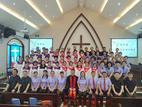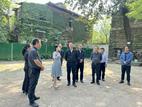A newly implemented ordinance from the Chinese government this week is forcing Protestant 'house churches' and Catholic 'underground' communities to seek 'guidance' from recognized religious organizations.
According from a notification earlier this month which was given by the State Administration for Religious Affairs, the ordinance requires organizers of religious activities at temporary sites to also apply for a permit that is valid for three years as reported by media sources.
Professor Ying Fuk-tsang, director of the Divinity School at the Chinese University of Hong Kong says that these recognized religious organizations include the China Christian Council and the national committee of the Three-Self Patriotic Movement, which are known in China as the "two major organizations".
The new ordinance has been causing fear among the 'underground' communities, with thoughts that they will come under greater control.
"It is well known that many 'house churches' are reluctant to register and are willing to be an illegal organization because they do not want to be under the two organizations," Professor Fuk-tsang wrote on his Facebook page.
The announcement follows a revised religious regulations in February, which spelled out criteria that religious organizations have to meet in order to be registered or to establish a place for religious activities.
100 CHURCHES HAS BEEN CLOSED IN A MONTH
The revised regulations have, in reality, been in force since the early 1980s, according to Aaron Ma, an Asia-based researcher for the Christian advocacy charity Open Doors International, but he said they are now being taken more seriously.
"There is now a heightened sense that a breach of regulations will be met by some form of warning, increased surveillance, or punishment. Certainly, most churches feel it is time to take extra precautions, to downsize or maybe even relocate some of their ministries," he told World Watch Monitor.
The enforcement of the religious regulations differs across the country and appears to depend on local authorities' interpretation of it, a local source told World Watch Monitor. Church leaders in several places, such as the eastern province of Zhejiang where between 2013 and 2015 - over 1,200 crosses were pulled down from churches, told the source that although "it sounds like it is becoming more serious, yet at this moment we don't feel much different".
One hundred churches were closed in Nanyang, central Henan province, in the month of March alone. Ma said local contacts told him that "Christians who used their own church building for meetings were targeted, and their buildings closed". Consequently, he said, Christians had gone back to meeting in homes.
In addition, somewhere in Henan, Ma said that officials banned 'house church' meetings and then went door-to-door, warning residents to stop attending 'illegal' church meetings or else, they face serious consequences.
The researcher suggested that the officials sometimes felt torn between superiors who voiced hostility towards Christians, and the local Christians with whom they had built positive relations. "In the wake of recent speeches by top leaders, local authorities do not want to appear weak when implementing new regulations. Conversely, they do not want to upset the tentative, but effective, relationship they have with local churches," he said.
"There is also the possibility that a crackdown will spark demonstrations, or lead to information being leaked to overseas media [seen as 'biased' by the government], so authorities must be extremely prudent in their engagement with the Church. The level of enforcement also varies from region to region, depending on this tentative relationship, and how the Church responds each time pressure is applied."
One example of what appears to be a measured and acceptable way for local authorities to show their subservience to the ruling party is to warn unregistered churches not to meet in rented or self-built church venues (e.g. commercial buildings), Ma said.
He also added that more and more regions are adopting this approach, and an increasing number of landlords refuse to extend leases to local churches.
The persecution of Christians has been hitting its all-time high since Chairman Mao Xedong took office, and fast forward today, many Christians are still being reprimanded to practice their faith.
According to some groups, they say that the persecution of Christians and other religious minorities in China is at its most intense since the Cultural Revolution, as churches were closed, Bibles confiscated and believers arrested at rates not seen in decades.
However, it is still a question on when this 'misunderstanding' will come to an end.








